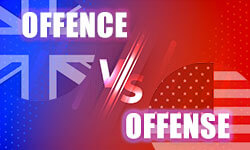
Consistency is essential in academic writing, as it guarantees that the work is rational and easy to follow. However, many students face difficulty in distinguishing between British English and American English, which can cause confusion when trying to determine the correct spelling of certain words, such as “offence” or “offense.” If you want to enhance your understanding of these two versions of English, please read on.
“Offence” or “offense”
“Offence/offense” refers to a violation of law or rule, a wrongdoing, or an act of committing an illegal or prohibited action. It can also denote a personal insult or displeasure. In this context, “offence/offense” is a noun. The choice between “offence” and “offense” depends on the English variant you are using. British English generally prefers “offence,” while American English uses “offense.” It’s essential to maintain consistency with the preferred spelling based on the English variant in your writing.

British English
offence

American English
offense
The more common spelling is “offence” in British English, whereas Americans prefer the spelling “offense.” There are no dual possibilities for the spelling in each English variant. It’s generally recommended to use the spelling that corresponds to the English variant you are writing in for consistency and strict adherence to regional style conventions.
Examples of using “offence” and “offense” as a noun
The following examples will illustrate the difference in the spelling of the noun “offence/offense” in British and American English.


“Offence” or “offense” as a verb
The verb “offend” has several related meanings, primarily concerning causing displeasure, anger, or hurt feelings. It involves doing something disagreeable to someone’s sensibilities, values, or norms, leading to emotional discomfort or offense. “Offend” can also mean to break a law or rule. In this sense, someone who offends is committing an offense, a legal violation, or a crime. The concept of offending is inherently relational, depending on the interaction between individuals’ actions and others’ perceptions or reactions. What offends one person might not offend another, highlighting the subjective nature of the offense.


“Offence” or “offense” as an adjective
“Offensive” is an adjective and refers to something that causes displeasure, resentment, or is likely to provoke a strong reaction. It can also describe actions, remarks, or behavior that are aggressive or disrespectful. The spelling of “offensive” is the same in both British English and American English.


“Offence” or “offense” as an adverb
The adverb “offensively” is closely related to the adjective “offensive.” “Offensively” describes actions or behaviors that are aggressive, disrespectful, or likely to cause displeasure or resentment. It indicates that something is done in an offensive manner. The spelling is the same in both British English and American English.


“No offence” or “no offense”
The phrase “no offence/offense” is often used before or after a potentially sensitive or critical statement to express that the speaker does not want to cause any hurt feelings or take offense. It’s a way of softening the impact of a statement that might be perceived as negative or critical.
People use the spelling that aligns with their regional variant, but the meaning remains the same. Thus, you say “no offence” with a “c” in British English and “no offense” with an “s” in American English.
- British English: No offence
- American English: No offense


FAQs
The British generally say “offence” (with a “c”) when referring to a violation or wrongdoing.
Yes, there is a difference. “Offence/offense“ refers to a violation or wrongdoing, and is a noun. “Offend” is a verb and means to cause someone to feel hurt, upset, or displeased, often by an action or statement.
Canadians typically spell it as “offence,” following the British English spelling convention. However, both would be correct to use in Canada.
In sports, both “offence” and “offense” are used, but the choice depends on the preferred spelling in the specific regional context. “Offence” is more common in British English, while “offense” is used in American English.
- ✓ Free express delivery
- ✓ Individual embossing
- ✓ Selection of high-quality bindings
